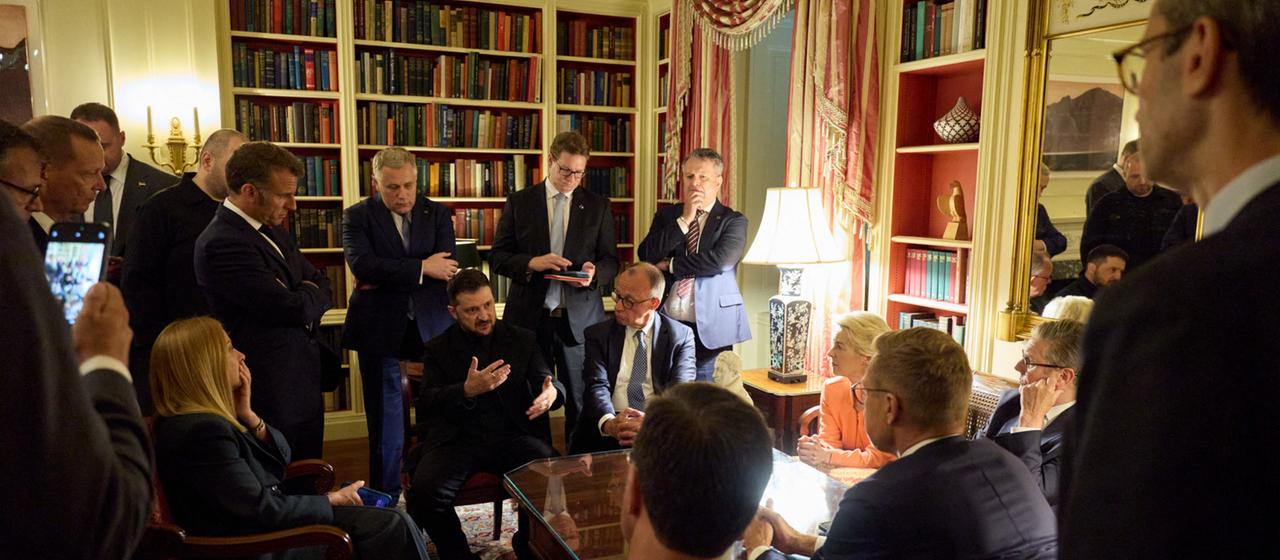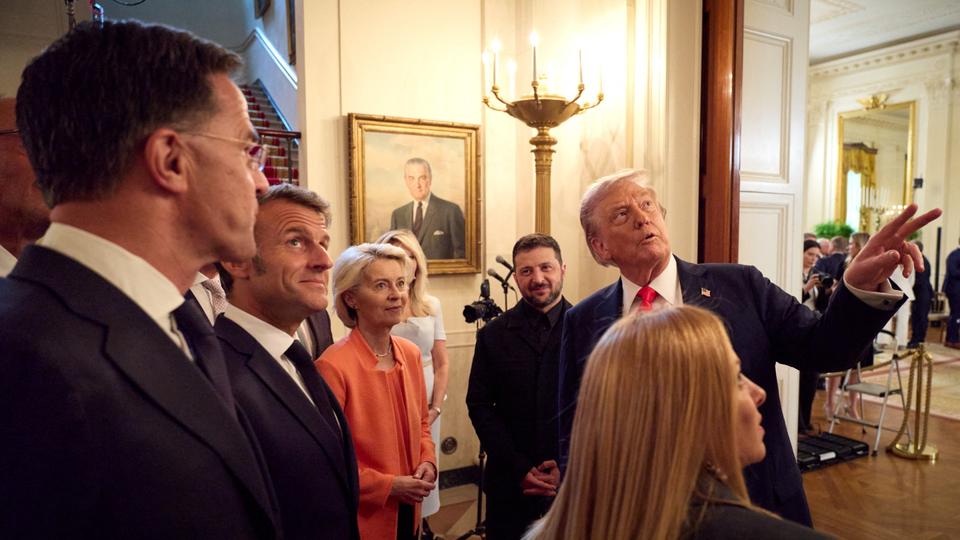
interview
Ukraine expert Andreas Umland does not expect the talks with Russia about Ukraine to be successful – because Moscow is making unacceptable demands. However, the meeting in Washington should nevertheless be viewed positively.
tagesschau.de: On the ARD morning magazine, the Ukrainian ambassador to Germany, Oleksii Makeyev, said the images from Washington were really very good. What's your take on this as a scholar?
Andreas Umland: I see it that way too. We haven't had any major or concrete results yet. But I think the atmosphere is important.
For one thing, relations between Volodymyr Zelensky and Donald Trump have seemingly been restored. Even more important from a perspective, the Washington meeting conveyed a sense of unity and commonality between the US and Europe. At least in the public part of these talks, the chemistry was apparently right.
While we don't yet know exactly what happened in the closed session, the decisive factor in the future will be whether the US and the key European players can act together. If the Washington format continues later, that would give me hope.
"Direct negotiations are unlikely to be successful at this time"
tagesschau.de: Recently, such a development no longer seemed likely. The meeting between Trump and Putin in Alaska gave the impression that two major powers would now decide Ukraine's fate alone.
Surrounding area: If the public images from last evening are to be believed, Trump appears to be turning away from Russia's claims. Topics such as the transfer of Crimea to Russia, the ceding of unoccupied Ukrainian territories to Moscow, or the establishment of Russian as a second official language in Ukraine did not appear in the public part of the speech. That was a good thing.
And even if such topics weren't a focus in the closed session, it's a format that can be used to continue working. Even direct negotiations between Vladimir Putin and Zelensky, if they actually come to fruition, are unlikely to be successful at the moment. Therefore, the question will soon arise again as to what the West is doing regarding Ukraine and Russia, and whether it will be able to act decisively and in a united manner.

"Every question marks a red line"
tagesschau.de: What do you think will be the decisive obstacle in talks between Putin and Zelensky?
Surrounding area: Russia, for example, is pursuing the idea that Ukraine should voluntarily withdraw from its current territories and transfer control to Russia. This primarily concerns the northern Donbass, which Ukraine has held for eleven years despite repeated Russian attacks and which is militarily and strategically important to Kyiv.
There are other issues that are not up for discussion for Ukraine—the Crimean issue, Ukraine's goal of NATO accession, the position of the Russian Orthodox Church in Ukraine, the Russian language in Ukraine, and so on. Each of these issues marks a red line in its own right.
The accumulation of non-negotiable issues makes me doubt that anything significant will come out of a meeting between Zelensky and Putin – if a personal meeting even takes place.
Achieving with diplomacy what could not be achieved militarily
tagesschau.de: Why is the northern Donbass so strategically important for Ukraine?
Surrounding area: This part of the front, I read from military experts, is very well fortified—so well that Russia has not yet conquered it. Russia has laid claim to the entire Donbass region since 2014. However, in eleven years, the Russian army has not succeeded in gaining complete control over the Donbass. Therefore, Putin is now attempting the non-military route of a diplomatically enforced cession of the remaining territories by Kyiv.
tagesschau.de: Ukraine consistently points out that the territorial affiliation of the entire Donbas, i.e., the Luhansk and Donetsk oblasts, is enshrined in the constitution, just like that of Crimea. But constitutions can be changed—why shouldn't that be possible in this case?
Surrounding area: There will be no majority for this; for most Ukrainians, this is an absurd proposal after 35 years of Ukrainian sovereignty. Moreover, Russia recognized Ukrainian territory in several treaties after the dissolution of the USSR; Putin himself signed a bilateral border treaty in 2003, ratified in 2004, which once again and explicitly established the Russian-Ukrainian border. Therefore, Ukraine will never de jure cede territory to Russia.
By raising such sensitive issues, Russia is attempting, among other things, to create national disunity in Ukraine and ultimately ignite a civil war. Moscow already attempted to transform the Kremlin-orchestrated pseudo-civil war in Donbass into a full-blown civil war between 2014 and 2021.
Putin repeatedly invokes fundamental questions of national sovereignty and Ukraine's cultural policy in the ceasefire terms in order to divide Ukraine. Ukrainians, of course, see through this, and therefore there will be no concessions from Zelensky or any other president.
"There will be no stable ceasefire"
tagesschau.de: Another fundamental contradiction of the past few months is the question of security guarantees. Do you consider the conflicting interests of both sides to be resolvable at all?
Surrounding area: There is a strategic, even logical, contradiction in this issue. If one wants to implement full security guarantees, one must station Western troops on Ukrainian territory on a larger scale. However, this would first require a comprehensive, stable, and lasting ceasefire or peace. Since Putin does not want to see Western soldiers in Ukraine, there will be no long-term, stable ceasefire.
Therefore, the only meaningful way the West can currently talk about is supplying arms and other support to Kyiv to increase Ukrainian security. Ultimately, the Ukrainian army is Ukraine's most important security guarantor. The West could also discuss no-fly zones over Ukraine, enforced, for example, by European fighter jets. And this could even be done today, before a ceasefire is reached.
tagesschau.de: Would this be possible without the USA, or would the United States have to be involved?
Surrounding area: The US wouldn't have to directly participate in the implementation of no-fly zones over Ukraine with its own pilots and aircraft. But countries like Poland, from which European fighter jets could operate, would demand some kind of extra security guarantee from Washington in the event that Russia attacks Polish airports from which fighter jets take off for deployment in Ukraine.
In that case, Poland would insist on the US commitment to truly stand by Poland and take action within the framework of its NATO mutual assistance obligation. If Poland or Romania receive such additional guarantees and possibly also US bases, the establishment of no-fly zones by European states over western and central Ukrainian cities, nuclear power plants, railway lines, airports, and so on seems conceivable.
tagesschau.de: US President Trump wanted to scale back, if not end, the US's involvement in this war, but has recently expressed ambivalence about it. How far would he go in terms of security guarantees?
Surrounding area: Trump's stance remains a problem. But a Russian attack on Poland would be a NATO country. The US and all other member states are obligated to provide assistance under the NATO treaty anyway.
Of course, Central and Eastern Europeans would be unsettled and would probably need explicit assurances from Trump that the famous Article 5 of the 1949 Washington Treaty is fully binding for him and that Polish or Romanian airports and other bases are actually protected by the United States.
"The attitude of the American public has changed"
tagesschau.de: Trump has been very inconsistent in his stance toward Ukraine and Russia in recent months, failing to follow up his ultimatums and threats against Russia with action. How reliable is the unity demonstrated in Washington in this respect?
Surrounding area: Trump is not very reliable as a person. However, a few structural things have changed in recent months. For example, the mood in Europe – Europeans have come closer together and see Ukrainian security as part of pan-European security.
The attitude of the American public has also shifted in Kyiv's favor, despite an intensive pro-Russian campaign in the ultra-conservative US media in recent months. Ordinary Americans and even Republican voters are once again more supportive of Ukraine, according to polls.
Trump cannot ignore both factors. He will also face increasing pressure from his own party ahead of the next congressional elections to avoid being seen as a traitor to Ukraine.
"Ukraine will decide whether the global security system will survive"
tagesschau.de: All in all, are you more optimistic or more pessimistic about the future negotiations with Russia?
Surrounding area: I would be pleased if there were actually a meeting between Zelensky and Putin, whether with or without Trump, and even more so if there were a ceasefire or even peace. That would directly affect me here in Kyiv.
But I believe that nothing stable and substantial will emerge from the current talks. I fear the negotiations will ultimately fail. It will be all the more important whether Europe and the US stand together in the future and continue yesterday's Washington format of joint decision-making, perhaps supplemented by a representative from Poland. The Euro-Atlantic coalition would then have to jointly consider what new sanctions should be imposed against Russia and what additional weapons should be delivered to Ukraine.
There would have to be enough motivation: Ukraine will determine whether the current global security system will survive or not. Ukraine is a regular UN member and an official non-nuclear-weapon state. If parts of Ukraine remain permanently annexed by Russia, an official nuclear-weapon state under the Nuclear Non-Proliferation Treaty and a permanent member of the UN Security Council, this would have serious consequences.
It could mean that many countries that have so far adhered to the non-proliferation of weapons of mass destruction would change their position. They would try to avoid Ukraine's fate and arm themselves with nuclear, chemical, and/or biological weapons, as they no longer trust international law, international organizations, and global solidarity. This would increase the risk of wars and terrorist attacks with catastrophic consequences worldwide.

